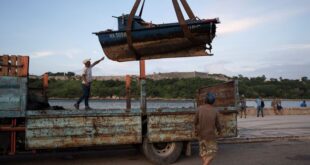LONDON (Reuters) – British opposition leader Keir Starmer said on Thursday a Labour government would set up a new police unit to tackle illegal migration and suggested he was open to a returns agreement with the European Union to solve the crisis.
How to tackle illegal migration is set to be a major battleground for both Labour and the governing Conservative Party in a national election expected next year, with many voters angry over the housing of immigrants in costly hotels.
Prime Minister Rishi Sunak has made “stopping the boats” – the arrival of migrants across the Channel – a priority but as yet his government’s policies, such as sending asylum seekers to Rwanda, have failed to get off the ground.
Starmer, whose party looks set to win the next election according to opinion polls, said in a comment piece in the Sun newspaper: “With Labour, you won’t get more gimmicks…You’ll get a proper plan to stop these dangerous boat crossings. I will ensure Britain leads the Continent in this.”
“That is going to mean setting up a brand new police unit, working both here and abroad, entirely dedicated to breaking up the smugglers’ business model,” he wrote.
He also suggested in an interview with the Times newspaper that a Labour government could seek an EU-wide returns agreement for asylum seekers who come to Britain, possibly accepting quotas of migrants in return for sending back people who arrive illegally.
Asked on ITV about how many asylum seekers he might take, he said such a returns agreement would only happen if people were still travelling across the Channel, something he wanted to stop.
“But … where people have got across, what we need to do is process their claims as quickly as possible and where people are not allowed to stay in the UK we need to return them.”
Starmer and his policy chief for home affairs, Yvette Cooper, are at The Hague to hold discussions with officials at the EU police force Europol about his plans.
Next week, Starmer will meet French President Emmanuel Macron, where he might also pitch his proposals.
(Reporting by Elizabeth Piper; Editing by Angus MacSwan)
 BeritaKini.biz Berita Viral Terkini di Malaysia
BeritaKini.biz Berita Viral Terkini di Malaysia





